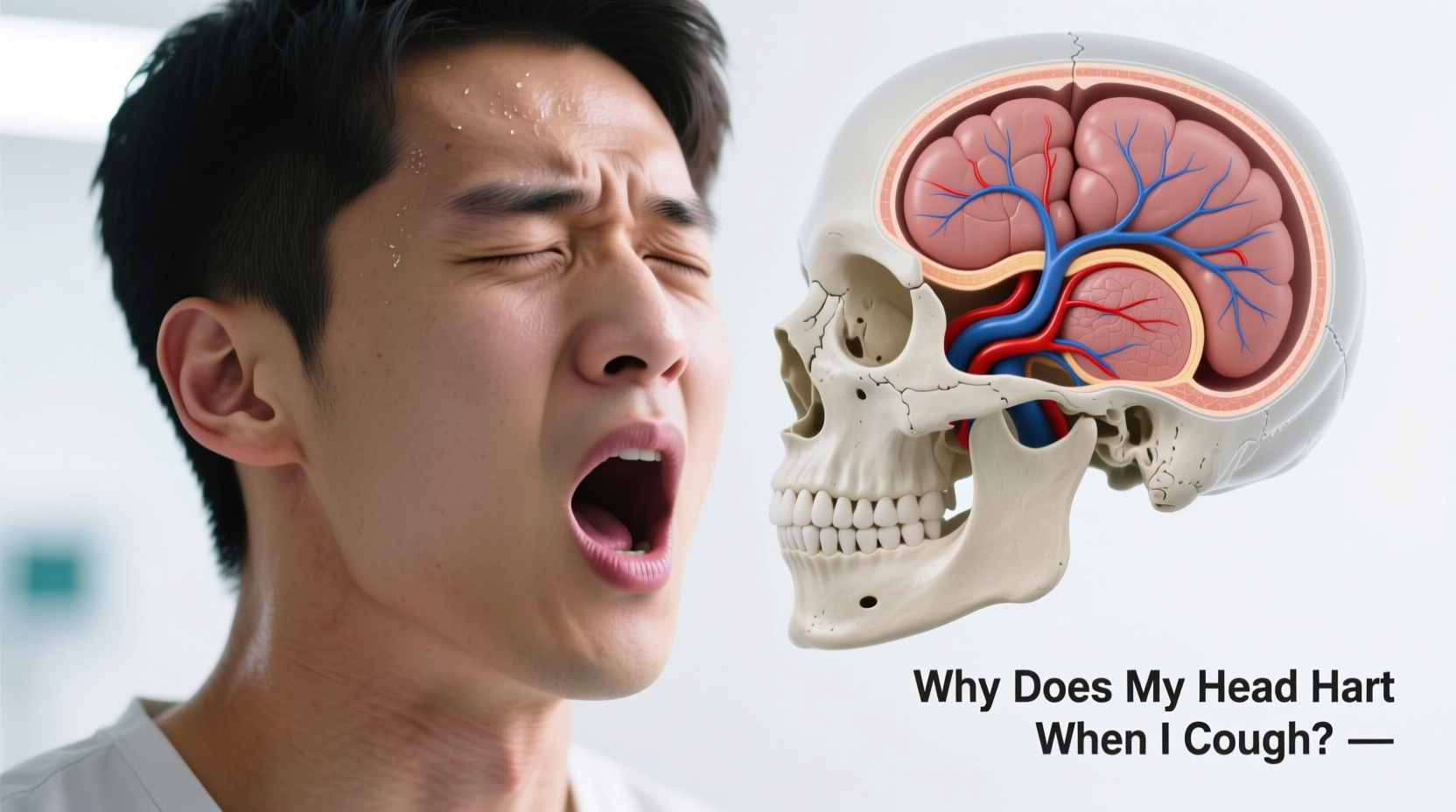It starts suddenly—a sharp pain in your head the moment you cough. Whether it's a single forceful sneeze or a prolonged bout of coughing, the sensation can be alarming. You're not alone. Millions experience what’s commonly known as a \"cough headache,\" a phenomenon where increased pressure in the chest and abdomen during coughing translates into sudden head pain. While often harmless, in some cases, it may signal an underlying condition that requires medical attention.
This article explores the science behind cough-induced headaches, differentiates between primary and secondary types, outlines risk factors, and provides practical steps for diagnosis, management, and prevention. Understanding what triggers these headaches empowers you to respond appropriately—whether it’s adjusting daily habits or seeking urgent care.
What Happens When You Cough and Your Head Hurts?

Coughing creates a rapid spike in intrathoracic and intra-abdominal pressure. This pressure is transmitted through the spinal canal and into the skull, briefly increasing intracranial pressure—the pressure inside your brain cavity. For most people, this change is brief and inconsequential. But for others, it triggers a jolt of pain, typically at the back of the head or on both sides.
The pain is usually short-lived—lasting only seconds to a few minutes—and resolves once the coughing stops. However, in rare cases, the headache may persist or worsen, indicating a more serious issue such as a structural problem in the brain.
Primary vs. Secondary Cough Headaches: Key Differences
Not all cough headaches are the same. Doctors classify them into two main types: primary and secondary. Distinguishing between them is critical for proper treatment.
| Type | Pain Duration | Onset & Intensity | Red Flags | Treatment Approach |
|---|---|---|---|---|
| Primary Cough Headache | Seconds to minutes (rarely up to 30 min) | Sudden, sharp, bilateral or occipital | No neurological symptoms | Medication (e.g., indomethacin), lifestyle changes |
| Secondary Cough Headache | Longer duration, may linger | Severe, sometimes progressive | Dizziness, imbalance, vision changes, nausea | Requires imaging and possible surgery |
Primary cough headaches are benign and account for about 75% of cases. They are more common in men over 40 and often occur without warning. Secondary cough headaches, though rarer, stem from structural abnormalities such as a Chiari malformation, brain tumor, or cerebrospinal fluid leak. These require immediate investigation.
“Cough headaches should never be dismissed out of hand. Even if they seem mild, persistent or recurrent episodes warrant neuroimaging to rule out serious pathology.” — Dr. Lena Patel, Neurologist, Cleveland Clinic
Common Triggers and Risk Factors
While anyone can experience a cough headache, certain conditions and behaviors increase the likelihood:
- Chronic respiratory conditions: Asthma, bronchitis, or COPD lead to frequent coughing fits.
- Upper respiratory infections: Colds and flu increase cough frequency and intensity.
- Obesity: Higher abdominal pressure may amplify intrathoracic spikes during coughing.
- Age and gender: Men over 40 are at higher risk for primary cough headaches.
- Straining activities: Heavy lifting, bowel movements, or laughing hard can mimic cough-related pressure changes.
In individuals with undiagnosed Chiari malformation—a condition where brain tissue extends into the spinal canal—coughing can trigger severe headaches due to obstructed cerebrospinal fluid flow. This underscores why evaluation is essential even if symptoms appear isolated.
When to See a Doctor: Warning Signs
Most cough headaches are fleeting and resolve on their own. However, certain red flags indicate the need for prompt medical assessment:
- Persistent or worsening pain: Headaches that last longer than 30 minutes or increase in intensity over time.
- Neurological symptoms: Dizziness, loss of balance, double vision, numbness, or weakness.
- New onset after age 50: Late-onset headaches are more likely to have secondary causes.
- Headaches triggered by other actions: Pain also occurs during sneezing, bending over, or sexual activity.
- Vomiting without illness: Especially if unrelated to food or infection.
If any of these signs are present, your doctor will likely order brain imaging—typically an MRI—to examine for structural issues. Early detection of conditions like Chiari malformation or tumors significantly improves outcomes.
Diagnosis and Medical Evaluation
Diagnosing a cough headache begins with a detailed patient history. Your physician will ask about:
- Frequency and duration of headaches
- Relation to coughing or other Valsalva maneuvers
- Family history of migraines or neurological disorders
- Presence of chronic lung or sinus conditions
Physical and neurological exams assess coordination, reflexes, and cranial nerve function. If secondary causes are suspected, the next step is imaging. An MRI with sagittal views is the gold standard for detecting Chiari malformations or mass lesions. In some cases, a CT scan may be used initially, but MRI provides superior soft-tissue detail.
A confirmed diagnosis of primary cough headache is one of exclusion—meaning no structural cause is found. Once ruled out, treatment focuses on symptom relief and prevention.
Effective Treatment and Prevention Strategies
Treatment depends on the type of cough headache. For primary cases, several approaches can reduce or eliminate symptoms:
Medications
- Indomethacin: A nonsteroidal anti-inflammatory drug (NSAID) highly effective for preventing primary cough headaches. Often prescribed at low doses.
- Propranolol or acetazolamide: Alternative options if indomethacin isn’t tolerated.
Lifestyle and Preventive Measures
- Manage underlying coughs: Treat allergies, asthma, or GERD (acid reflux), which can contribute to chronic coughing.
- Avoid straining: Use stool softeners if constipated; lift objects with proper technique.
- Quit smoking: Smoking irritates airways and increases cough frequency.
- Stay hydrated: Thins mucus and reduces coughing fits, especially during colds.
For Secondary Cough Headaches
If imaging reveals a structural issue, treatment may involve surgery. For example, posterior fossa decompression is commonly performed for symptomatic Chiari malformation. Post-surgery, most patients report significant or complete headache relief.
Frequently Asked Questions
Can a cough really cause a dangerous headache?
Yes, although rare. Most cough headaches are harmless (primary), but a small percentage are secondary to serious conditions like brain tumors or Chiari malformation. Persistent or worsening symptoms require evaluation.
How long do cough headaches usually last?
Primary cough headaches typically last from a few seconds to a couple of minutes. Some may last up to 30 minutes. If pain persists beyond this or recurs frequently, consult a neurologist.
Is it safe to ignore a cough headache if it only happens once?
An isolated episode after a strong cough is usually not concerning. However, if it happens repeatedly or is accompanied by dizziness, vision changes, or imbalance, seek medical advice promptly.
Real-Life Example: John’s Experience with Cough Headaches
John, a 52-year-old warehouse supervisor, began experiencing sharp head pains every time he coughed during allergy season. At first, he dismissed them as stress-related. But when the headaches started lasting longer and were followed by dizziness, he consulted a neurologist. An MRI revealed a mild Chiari Type I malformation. After surgical decompression, his cough headaches disappeared completely. His case highlights how seemingly minor symptoms can point to treatable but significant conditions when properly investigated.
Conclusion: Take Head Pain Seriously—But Stay Informed
Coughing headaches are more than just a nuisance—they’re a signal from your body that pressure dynamics in the head and spine are being disrupted. While many cases are benign and manageable with medication and lifestyle adjustments, ignoring recurring or severe symptoms can delay diagnosis of potentially serious conditions.
You don’t need to live in fear of every cough. But you should take action if headaches become frequent, painful, or are accompanied by neurological changes. With proper evaluation, accurate diagnosis, and targeted treatment, most people achieve full relief. Knowledge is power: understanding your symptoms puts you in control of your health.









 浙公网安备
33010002000092号
浙公网安备
33010002000092号 浙B2-20120091-4
浙B2-20120091-4
Comments
No comments yet. Why don't you start the discussion?